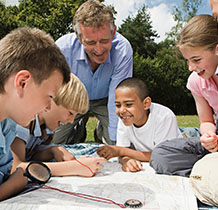Resource Database

Click on a topic or use the search box below to look for a listing:
There are 488 resources. Displaying 10 resources per page.
Positive behavior begins and ends with relationships-not with the rules. This staff development resource from National AfterSchool Association includes a brief article with tips for positive behavior, a discussion guide, and application activities. The author reminds us that the relationship-building process takes time, and offers tips afterschool practitioners can use alongside their behavior systems to deepen the relationships between staff and youth.
View Resource
Diverse Learners
Not only do out-of-school suspensions cause students to miss valuable class time, they also disproportionately affect students of color. A recent blog post from American Youth Policy Forum highlights research on this trend and explores an emerging solution. Restorative justice, a new approach to school discipline, stresses relationships, community, and communication, and is starting to show promising results across the country.
View Resource
Diverse Learners
Kids love technology, but wouldn’t it be great if they could learn to make their own animations, video games, or phone apps? Presented by code.org and hosted by Afterschool Alliance and the National AfterSchool Association, this webinar recording explains how afterschool practitioners can get students started with coding during the Hour of Code. This 1-hour introduction to computer science is designed to demystify code and show kids of all ages that they can learn the basics.
View Resource
Technology
By now, we have all heard and read about the importance of non-cognitive skills-also referred to by many other terms including social and emotional skills, 21st century learning skills, or growth mindset-in the adolescent years. Presented by researchers from the Collaborative for Academic, Social, and Emotional Learning (CASEL) and social and emotional learning program providers, this webinar recording focuses on how afterschool practitioners can apply what is known from effective social and emotional learning programs to their own work with youth in out-of-school time programs. The webinar is hosted by the Afterschool Alliance.
View Resource
It’s never too early for afterschool leaders to begin thinking about sustainability for their program. This article in AfterSchool Today, the magazine of the National AfterSchool Association, highlights some key considerations that go into sustainability planning. The ideas are drawn from the Wallace Foundation report Growing Together, Learning Together: What Cities Have Discovered About Building Afterschool Systems.
View Resource
Sustainability
It may be cold outside right now, but your summer learning program will be starting before you know it. The Department of Education’s You for Youth web portal has several summer learning resources for expanded learning practitioners. These include fact sheets on the importance of summer learning (in English, Spanish, and French), strategies for engaging community members, family members, and students of all ages, and a range of activities.
View Resource
Program Management
Published by America’s Promise Alliance, this white paper illustrates how national service is making a positive impact on young people and closing the graduation gap-from early literacy through high school graduation and beyond. The authors of this paper reviewed numerous evaluation reports, policy papers, academic journal articles, and program summaries related to the contributions that AmeriCorps, and national service more generally, have made and can make to close the nation’s graduation gap. In addition to having gathered promising practices, this paper offers recommendations to leverage and continue effective programs that work.
View Resource
Program Management
A steady stream of afterschool evaluations are showing important gains for children, not only in terms of academic achievement but also in regard to safety, discipline, attendance, and avoidance of risky behaviors. This updated evaluations “backgrounder”-a summary of formal evaluations of afterschool programs-from the Afterschool Alliance includes new research that demonstrates the impact of afterschool programs on academic outcomes, student behavior, and parental concerns about children’s safety. Afterschool practitioners can use this resource to illustrate the effectiveness of quality afterschool programs to stakeholders.
View Resource
Program Management
Created by the New York State Afterschool Network, the online Quality Self-Assessment Tool is organized around 10 essential elements of an effective afterschool program, all of which come from evidenced-based practice: environment and climate, administration and organization, relationships, staffing and professional development, programming and activities, linkages between day and afterschool, youth participation and engagement, parent, family, and community partnerships, program sustainability and growth, and measuring outcomes and evaluation. Each element contains a list of quality indicators that are rated on a performance level from 1 to 4. There are also examples of what a program might look like at each performance level for all indicators.
View Resource
Program Management
Quality is on the forefront of afterschool programs. Afterschool leaders can play an important role in supporting staff as they grow the capacity to recognize and incorporate quality into their programs. This blog post from the National AfterSchool Association lists 10 simple actions that expanded learning leaders can take to coach their staff toward youth program quality.
View Resource
Program Management
There are 488 resources. Displaying 10 items per page.
- Academic Enrichment
- Afterschool Enrichment
- Classroom Management
- College and Career Readiness
- Diverse Learners
- Family and Community Engagement
- Program Management
- Social-Emotional Learning
- Sustainability
- Technology
Subscribe to the Illinois Quality Afterschool newsletter and resource bulletin.
